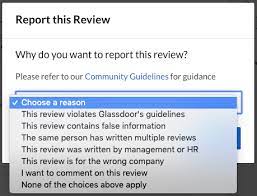Have you ever stumbled across a negative review on Glassdoor while researching a potential employer? It can be discouraging to read such reviews, and it may leave you wondering how to remove them. In this article, we will explore the different types of negative reviews found on Glassdoor and discuss the best ways to address and respond to them. We’ll also uncover what businesses can do to keep their company’s reputation intact by removing or responding to any malicious false reviews that may have been posted. So if you’re looking for tips on how to handle the occasional bad review, read on!
Table of Contents
Toggle
Purpose of the Article
The purpose of this article is to provide readers with information on how to remove or respond to negative reviews on Glassdoor. We will explore the various types of negative reviews that may be posted, from legitimate complaints about a company’s policies and practices, to malicious fake reviews from disgruntled employees. Additionally, the article will discuss ways for companies to protect their online reputation by taking action against any false or malicious reviews. The goal is to inform readers about the best ways to handle negative reviews so they can maintain an accurate and honest representation of their business.
When it comes to negative reviews on Glassdoor, having the right strategy and taking decisive action can help to protect your business’s online presence. Keep reading for an overview of how to respond to these reviews in a timely and effective manner.
Overview
Negative reviews on Glassdoor can have a major impact on a business’s overall reputation. It is important to take quick action in order to protect your online presence and respond to any false or malicious reviews. Companies should start by reviewing the review carefully, taking note of any specific complaints that are being made. If the review is found to be false or malicious, companies should contact Glassdoor and request for it to be removed. Additionally, companies should respond politely and professionally to all negative reviews, addressing each complaint directly and explaining their actions in order to show potential customers that they are listening and taking their concerns seriously. Finally, companies can proactively manage their online reputation by responding quickly and professionally to customer feedback, as well as making sure that all policies and procedures are up-to-date. With the right strategy in place, businesses can maintain an accurate representation of their brand online.
Understanding Negative Reviews on Glassdoor
Glassdoor is a powerful tool for businesses to monitor customer feedback and positive reviews. Unfortunately, negative reviews can have a significant impact on a company’s reputation and it is important to take quick action in order to address any false or malicious reviews. Companies should start by reading the review carefully, making sure to note any specific complaints that are being made. If the review is found to be false or malicious, companies should contact Glassdoor and request for it to be removed. Additionally, companies should respond politely and professionally to all negative company reviews, addressing each complaint directly and explaining their actions in order to show potential customers that they are listening and taking their concerns seriously. Finally, proactively managing one’s online reputation is key; responding quickly and professionally to customer feedback as well as ensuring policies and procedures are up-to-date will help maintain an accurate representation of the business online.
By taking the time to properly monitor and manage customer feedback on Glassdoor, businesses can ensure that any false or malicious defamatory reviews are appropriately addressed and their online reputation is accurately represented. But what exactly is Glassdoor? Read on to find out more!
What is Glassdoor?
Glassdoor is an online platform that allows employers and satisfied employees to share information about salaries, workplace culture, and other pertinent details. It also provides users with the ability to read and post reviews about a company culture or role. This helps to create transparency between employers and job seekers, which can be beneficial for both parties. Glassdoor also offers insights into how companies are performing financially, their potential employee satisfaction ratings, and more. By utilizing Glassdoor’s resources, employers can ensure they are providing a positive work environment while job seekers can gain valuable insight into potential workplaces before applying. Additionally, researching these online reviews can help job seekers make informed decisions on where to apply for roles as well as helping employers build better teams.
Different Types of Negative Reviews
Negative reviews can come in many forms, and it’s important to understand the different types so that you know how to address them.
The most common type of negative review is a complaint. Complaints often contain criticism of a company’s policies, procedures, products or services. They may also include personal grievances or experiences with customer service. It’s important to take all complaints seriously and respond promptly in order to provide a satisfactory resolution.
Another type of negative review is an incorrect or inaccurate statement. This can occur when a customer posts false information about your business or product, either intentionally or unintentionally. It’s important to verify the accuracy of these statements and respond with factual evidence if necessary.
Finally, some customers may leave reviews that are simply mean-spirited or contain malicious intent. These reviews should be flagged for removal as soon as possible, as they can damage your reputation and hurt your business. As such, it is important to carefully monitor Glassdoor for any signs of this type of review and take appropriate action when necessary.
Common Reasons for Negative Reviews
Negative reviews are often caused by customer dissatisfaction due to a lack of quality, value, or service. Failure to meet customer expectations can result in complaints about the product or service, as well as negative comments about the company profile policies and procedures. Other common reasons for negative reviews include slow response times from customer service, incorrect information on the website or in advertising materials, poor product packaging, and inadequate delivery times. Additionally, customers may leave negative reviews if they feel that their honest feedback was not taken seriously or if they were treated unfairly. Finally, some customers may simply be unhappy with their purchase and voice their frustrations through a review.
How Does a Business Respond to Negative Reviews?
No matter how hard a business may strive to ensure customer satisfaction, negative reviews are inevitable. How a business responds to these bad customer reviews can make all the difference in terms of reputation and customer loyalty. The first step is to acknowledge the review and address any issues mentioned. Apologizing for the inconvenience and offering a resolution or solution shows customers that the business takes their negative feedback seriously and values their opinion. Additionally, businesses should consider using automated responses or templates that thank customers for taking the time to leave feedback and offer assistance if needed. By responding in a timely manner with genuine care, businesses can show customers that their concerns are taken seriously and ultimately help improve customer relationships.
By responding to customer honest reviews with empathy, understanding, and a resolution, businesses can help to build customer loyalty and create an environment of trust. Now let’s take a look at how best to acknowledge the reviewer’s feedback.
Acknowledge the Reviewer’s Feedback
Acknowledging the reviewer’s feedback is an important step in responding to negative misleading reviews. It shows customers that their opinion matters and that the business takes their concerns seriously. A simple “Thank you for taking the time to leave your review” can go a long way in showing customers that their opinion matters. Additionally, businesses should take the time to address any issues mentioned in the review, apologize for any inconveniences caused, and offer a resolution or solution if needed. By responding with empathy, understanding, and a resolution businesses can create an environment of trust and build customer loyalty. Showing customers that their opinions are valued and taken into consideration is key when it comes to responding to negative internet reviews.
Respond in a Professional Manner
When responding to negative business reviews, it is important to remain professional and courteous. Businesses should avoid becoming defensive or argumentative, as this can create an even bigger problem. Instead, businesses should focus on understanding the customer’s issue and offering a resolution. Acknowledge the customer’s feelings and respond with empathy. Additionally, businesses should thank the customer for taking the time to leave their review and make sure they understand that their opinion matters. This helps build customer loyalty and trust in the business. Lastly, offer a resolution if possible and follow up with customers to ensure that their issue was resolved successfully. By responding in a professional manner, businesses can show customers that their opinions matter and turn a negative experience into something positive.
Offer Resolution and Follow Up with the Reviewer
Offering resolution and following up with reviewers is a great way to address negative poor reviews. Businesses should always strive to provide customers with an effective resolution that meets their needs. This can include offering a refund, providing a replacement product, or offering discounts on future purchases. Additionally, businesses should make sure to follow up with the reviewer after the issue has been resolved. This shows that the business is dedicated to customer service and provides reassurance that the issue has been taken care of. Following up also helps build trust between businesses and customers, as it demonstrates that the business culture cares about its customers’ satisfaction. By providing resolution and following up with reviewers, businesses can turn a negative experience into something positive.


